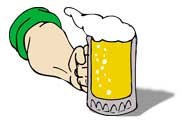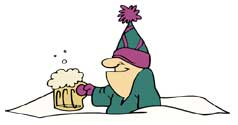|
|
Beer: Shall We Cheer This Drink With No Peer?
by Marjorie Dorfman
|
 Throughout the Middle Ages, hops became widely used as both a preservative and a way to make beer more refreshing. Hops are said to have been first used to flavor beer in Brabant monasteries in what is now Belgium. This explains the legend falsely attributing the creation of beer to the Brabant king, Gambrinus, who is revered to this day as the patron saint of beer. With the use of hops, beer revealed its "clear character" and began to closely resemble the way it is today, both in taste and appearance. In order to guarantee a high level of quality and consistency, the Duke of Bavaria, Wilheim IV, proclaimed the German Beer Purity Law in 1516. This decree established for the first time that only barley, (later malted barley), hops and pure water could be used to brew beer. This law is the oldest food law in the world today. Throughout the Middle Ages, hops became widely used as both a preservative and a way to make beer more refreshing. Hops are said to have been first used to flavor beer in Brabant monasteries in what is now Belgium. This explains the legend falsely attributing the creation of beer to the Brabant king, Gambrinus, who is revered to this day as the patron saint of beer. With the use of hops, beer revealed its "clear character" and began to closely resemble the way it is today, both in taste and appearance. In order to guarantee a high level of quality and consistency, the Duke of Bavaria, Wilheim IV, proclaimed the German Beer Purity Law in 1516. This decree established for the first time that only barley, (later malted barley), hops and pure water could be used to brew beer. This law is the oldest food law in the world today.
The advent in the nineteenth century of James Watt’s steam engine and the artificial cooling system invented by Carl von Linde revolutionized the beer brewing industry. It had long been known that the making of good beer required certain temperatures. From the time of von Linde’s invention, brewing became a year round enterprise. In the area of scientific research, Louis Pasteur made great strides in 1876. His Etudes sur la Biere (Studies Concerning Beer) revealed the importance of microorganisms and bacteria, culminating in the word that today bears his name; pasteurized.
Early native Americans had been brewing beer for many centuries before Columbus set sail for the New World. In the American colonies, English settlers relied heavily on shipments of ales from England while the Dutch in New Amsterdam (New York) started their own breweries as early as 1632. The first beer with a brand name came from there; it was known as Red Lion Brewery. In 1683, William Penn, the founder of Pennsylvania, started the first English commercial brewery. Sam Adams, while well known for his ardent patriotism, was also a brewer of trade. George Washington was a lover of porter and had his own recipe for beer, which is handwritten in an old notebook that can be seen today at the New York Public Library. The 1880’s became the golden age of American brewing, seeing a surge in growth that culminated in the formation of 2,272 American breweries. All of the big companies like Anheuser-Busch, Miller, Coors and Pabst date from this era.
The beer brewing industry chugged along at a comfortable pace until January 16, 1920, the date the 18th amendment (Prohibition) took effect. The flow of illegal beer and liquor was mostly controlled by gangsters (Al Capone) and the city of Chicago with its bathtub gin and speak-easies became one of the most violent examples of how poorly most people cried into their beer. The Volstead Act, the law enacted to enforce prohibition, created special units to operate as independent federal police squads, the most famous of which was Elliot Ness and his Untouchables. The beer industry never really recovered from Prohibition and neither did Elliot Ness or Al Capone. Today, ninety-five per cent of all beer consumed in the United States is American beer and eighty per cent of it is made by the five largest companies; Anheuser-Busch (Budweiser), Coors, G. Heilman (Henry Weinhard), Miller and Pabst.

The redeeming value of beer in American society is most certainly a moot point, perhaps akin to the effects of the Colt revolver on the decreasing population of the Old West. Bars have been the meeting place of many minds both sodden and sober, for centuries. Perhaps there is a whisper here of Mr. Benjamin Franklin and his poor Richard’s advice of all things in moderation. I have heard (from an old grapevine) that he too liked his lager, and it probably kept him from going early to bed and early to rise on more than one occasion. Mr. Franklin aside, (for he was a great man drunk or sober), if you are going to drink beer, at least buy the best you can afford for as the ancients (or at least the middle-aged) used to say, "life’s too short to drink cheap beer!"
< back to page 1
|
|
|
|
 |
|
|
 "Our lives are not in the lap of the gods, but in the lap of our cooks." "Our lives are not in the lap of the gods, but in the lap of our cooks."
Lin Yutang
The Importance of Living, 1937
"Talk of Joy: there may be things better than beef stew and baked potatoes and home-made bread
. . . there may be."
David Grayson
Adventures in Contentment, 1907
|

Click for a printer friendly version of this article.
|
|